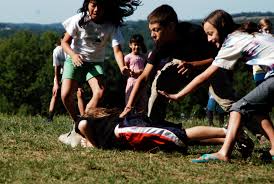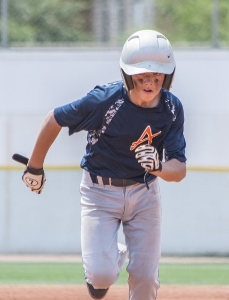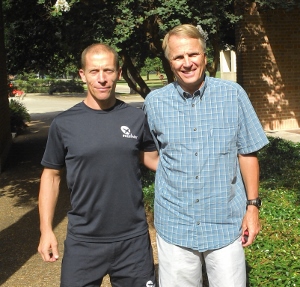LTAD: building young people
“Life is a process, but it’s hard to get through to the kids”
Finn Gundersen, GAIN VII.
 “What is LTAD?” has been demoted to a project question for students, a scientific discussion, or a pdf issued by National Governing Bodies (NGBs).
“What is LTAD?” has been demoted to a project question for students, a scientific discussion, or a pdf issued by National Governing Bodies (NGBs).
But, in my opinion, it’s about people: coaches, parents, teachers and, most importantly, the children.
Gundersen really brought this to life in this excellent seminar, based upon his work at Burke Mountain school in Vermont.
It starts with a foundation of:
- Trust.
- Honesty.
- Respect.
If you trust the athlete, then you can give them some freedom to act. Gundersen has no “leaders”, instead, everyone is a leader: everyone takes responsibility.
I like this aspect, I see far too many youngsters walking around with “sports leader” or “physical leader” t-shirts: what about everyone else?
With no peer groups, no heroes, no rewards and privileges “everyone is responsible for the community“. The kids have to do chores such as washing up straight away. There are no gradings of ability such as ABCs, labels are avoided.
“Never underestimate your intellectual and athletic ability”
 is what Gundersen tells the kids. He tells the coaches “You’re not there to pick out a winner, you are there to coach all of them.” He told us “Don’t let teachers get away with it.” NO LABELS, we have to give HOPE to every kid in the programme.
is what Gundersen tells the kids. He tells the coaches “You’re not there to pick out a winner, you are there to coach all of them.” He told us “Don’t let teachers get away with it.” NO LABELS, we have to give HOPE to every kid in the programme.
(Compare that to a teacher who said I would never produce a good school gymnast because I was “working with the dregs“: how to write off 7 year olds.)
Coaches have to be patient, have belief in what they are doing and be non-judgemental.
This may sound a bit soft and cuddly, but the work at Burke Mountain was designed to teach the kids desire, andhelp them to go after things they wanted.
This requires Hard Work in:
- Community
- Academics
- Athletics
Some of this came back to PTA (Pain, Torture, Agony): they had to run in the rain and cold. They learnt how to suffer. The harder the better, not the line of least resistance.
If you think that is harsh, think about the new medical term “Exercise deficit disorder” where kids are put in front of a screen for 3-6 hours a day with no play time.
The reality of LTAD
Gundersen highlighted some of the LTAD issues they face: it’s as much a management strategy as it is a science.
- Sport vs sports conflict: sports try to get the best kid earlier and earlier, competing with each other.
- 25% of kids in high school do NOT like to compete, 50% like to, 25% can take it or leave it. This must be accounted for when planning physical activity.
- Everyone has a different genotype, everyone therefore has different needs.
- Early vs late maturers: there is an arms race within certain sports such as skiing with a smaller pool of athletes and fewer clubs being able to support good competition levels. This can result in over-investment in the early maturer when all evidence shows that late maturers do better.
The Profession of Developing People
 With his vast experience, Gundersen has realised that he is in the profession of developing people: it is not about the facilities. Whether the people are the coaches or the athletes, that is where investment and development must take place.
With his vast experience, Gundersen has realised that he is in the profession of developing people: it is not about the facilities. Whether the people are the coaches or the athletes, that is where investment and development must take place.
He looks for certain personalities: do the coaches have an operational mindset? Are they interested in continuous improvement? Do they accept responsibility? Are they accountable? Is there role clarity and acceptance of that role?
If the coaching structure and set up works, then the young athletes will get a better experience.
This was a great seminar, and Finn was available to talk the whole week, so I was picking up lots of tips from him. A very genuine and engaging individual: a lot of sporting bodies in the country would benefit from his advice.
Further reading:

[…] did a presentation with the parents on Long Term Athlete Development (LTAD) with special emphasis on the dangers of early sports specialisation. I told the parents […]